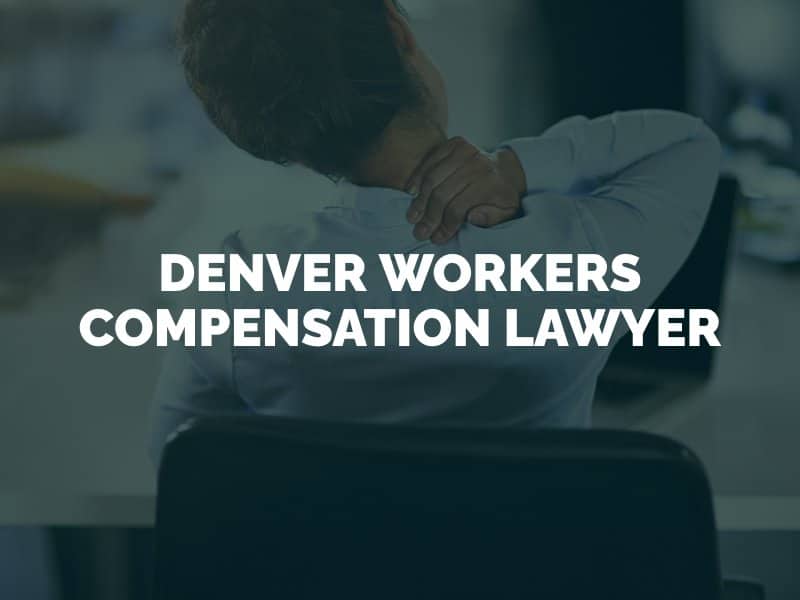While injured workers must follow specific steps to obtain benefits, no covered employee should be denied coverage. At Fang Law Firm, our Denver workers’ compensation attorneys can help you protect your legal rights.
Workplace injuries are all too common. When employers or insurance carriers deny or minimize a workers’ compensation claim, they can be catastrophic. Most workers in Colorado are entitled to monetary benefits after being injured on the job. Obtaining legal representation is, in some cases, the only way to obtain those benefits.

Understanding when to hire a lawyer after a work injury occurs can be confusing. Often, individuals sustain an injury, report the injury to their employer, go to the doctor, and then just count on the system to work for them. However, there are times when insurance carriers or employers push back against these claims or delay them unnecessarily, and an individual may not even realize something is wrong until it is too late.
We strongly encourage you to speak to a skilled workers’ compensation lawyer in Denver as soon as possible so that you can be sure that you have an advocate by your side looking out for your well-being. An attorney can get involved early and make sure that the process goes as smoothly as possible. This will include making sure that you are properly evaluated and that the claim is accepted quickly. An attorney will also help you through any appeals processes necessary.

Remington, hailing from Colorado, champions the rights of those harmed as a personal injury lawyer, standing up against corporations solely focused on profits. Growing up in a household that prized diligence and universal respect, he completed his education at Saint Mary’s Catholic High School and earned a Bachelor’s degree from the University of Northern Colorado before pursuing his legal studies at the University of Arkansas School of Law on a scholarship. With a breadth of experience across various legal domains, Remington passionately advocates for equitable laws that safeguard individuals. As a personal injury lawyer, he has successfully secured tens of millions of dollars in compensation for his clients throughout Colorado.
“My experience with this team, their communication from the assistant to the lawyers was incredible. I cannot say enough. They took care of me from day one. Reach out to them you will not be disappointed, Konrad is so empathetic and so personable and they fight for you even on holidays. Thank you Fang law firm for what you did for me.”
– CRISTA ANGEL
“After having a car accident and going through tough times, the Fang Law Firm helped me a lot and I highly recommend them to everyone. Remington, London and Konrad really did a great job. I felt supported having a strong team fighting for me, and the process was smooth from the beginning. I also liked that they are very responsive. They absolutely deserve all the five star reviews they have.”
– MIKE SAWAGED
Individuals who sustained workplace injuries often wonder how much their claim will be worth. Without examining a person’s exact case, there is no way to give a dollar figure. However, there are various factors that go into valuing a claim.
Perhaps the most important aspect of a workers’ compensation case is examining medical expenses. When a person sustains an on-the-job injury or illness, they deserve to have all of their medical bills covered. This includes emergency medical bills as well as all ongoing medical treatment, physical therapy and rehabilitation, prescription medications, medical devices, and more. Depending on the severity of the workplace injury, this medical expense coverage can become extensive. Medical bills can rise into the hundreds of thousands of dollars.
Aside from medical expenses related to a workplace injury, we have to examine lost wages. If an individual cannot work due to their injury, they should be able to receive wage replacement through temporary or total disability benefits. In general, individuals who are unable to work will receive two-thirds of their wages based on what they were earning at the time the injury occurred. However, if an injury is scheduled or non-scheduled, the injured worker will receive payment based on the schedule formulation, per the workers’ compensation laws in Colorado.
First and foremost, workers’ compensation insurance covers the medical expenses directly related to your injury. These medical bills can include medications, surgeries, doctor’s visits, physical therapy, and other necessary medical procedures. In addition to medical expenses, you can receive full benefits to supplement lost wages due to your injury.
Under the Colorado workers’ compensation system, you can receive one of four disability benefits packages based on the severity of your injuries.
If your workplace injury or illness causes complete and permanent impairment, you qualify for PTD. You receive 2/3 of the average weekly wage you earned at the time of the injury. You receive these benefits for the rest of your life.
If you permanently lose function of a body part or body system as the result of your injury or illness, you qualify for PPD. You receive benefits based on a percentage that depends on the degree of your disability. You can either receive benefits from scheduled impairment, which involve some pre-determined body parts and corresponding values, or non-scheduled impairment. The latter option involves disability in body parts not included on scheduled impairment, such as spine, mental function, and lungs.
If your injury or illness is temporary but totally disabling and you cannot receive wages, you qualify for TTD. After you miss three days of work, you receive TTD on the fourth day out of work and receive your average weekly wage as a payment every two weeks.
You qualify for TPD if your injury or illness temporarily disables you but you can return to work with modified hours, duties, and wages.
The workers’ compensation system is in place to provide injured employees a way to obtain medical benefits and replacement lost wages for occupational injuries and illnesses without the task of having to prove fault. The downside, however, is that the types of financial compensation available are more limited compared to a personal injury claim.
In exchange for the convenience and simplicity of the no-fault system, claimants give up the right to seek the following types of damages:
These are types of noneconomic damages (also known as general damages) that are generally not available in a workers’ compensation claim. In addition, Colorado law caps disability and wage loss benefits at certain maximum amounts. These caps change from year to year.

Workers’ compensation laws protect employees when they receive injuries on the job or as a result of their job duties. All Colorado employers must maintain workers’ compensation insurance for all of their employees, with a few exceptions. Workers’ comp insurance helps injured workers receive medical treatment as well as supplementary income when they take time off to heal.
Sometimes, injuries sustained on the job can be so severe that they require intensive medical care and weeks off from work. This system allows for fair recovery and limited damages for workers harmed on the job.
If you receive an injury on the job, you must follow the following process to receive workers’ compensation benefits in Colorado.
Despite workers’ compensation laws, many unnecessary barriers may prevent workers from receiving insurance settlements. This process can delay medical treatments and worsen financial hardship for the injured worker.
Many disputes can arise when it comes to workers’ compensation law in Colorado. When you file a claim, you will need to prove that your job or a function of your job caused your injuries. Some employers can cast doubt on your injuries and refuse to file a claim. Others may neglect filing a claim on your behalf altogether.
When this issue arises, hiring a workers’ comp attorney can help you receive the benefits you need to recover. Fang Law Firm can help you accomplish this process by consulting with medical experts about your injuries, analyzing your medical records, and presenting the evidence to your employer and the insurer. Our Denver team of experienced Denver injury lawyers can help you build a strong case to protect your legal rights.
Workers’ compensation claims are not the same as personal injury lawsuits. Some injuries are strictly personal injury claims, others are strictly workers’ compensation claims, and others can be both. State and federal laws and employment contracts govern these differences.
In most situations, workplace injury victims will be unable to file personal injury lawsuits against their employer. However, there are times when third-party civil personal injury lawsuits may be appropriate. If an injury or illness was caused by a third party aside from the employer, the injury victim may be able to file a lawsuit to recover additional types of compensation above and beyond what is available through the workers’ compensation benefits. These other parties can include contractors or subcontractors, government regulatory agencies, and any other party whose negligence contributed to the injury.
Any workplace injury victim needs to speak to a skilled work injury lawyer who can help them determine the best apps moving forward when it comes to filing claims and lawsuits.
It is relatively common to have an insurance company deny a worker’s initial workers’ comp claim. It is important not to give up if your claim gets denied. Take your case and all communications you have received from an insurer to a workers’ compensation lawyer in Denver for assistance.
Common reasons insurance companies give for claim denials include:
If your claim gets denied, your lawyer can help you file another claim, request an internal review of your claim by the insurance company, submit for an external review by the Colorado Division of Insurance or file an appeal. If there is evidence that the insurance company wrongfully rejected your valid claim, your lawyer may also be able to file a bad faith claim against the insurer.
Yes. You must file your workers’ comp claim within the state’s deadline – also known as a statute of limitations – or you will lose the right to recover financial compensation. In Colorado, the time limit to file is two years from the date of the workplace accident, although the courts may grant up to three years in unique situations.
The clock on the statute of limitations will begin on the date of the workplace accident unless the victim did not discover his or her injury or illness right away. In a case involving a delayed discovery, the clock will start ticking on the date of actual discovery or the date that the individual reasonably should have discovered the injury with due diligence.
Two years may sound like a long time, but the deadline can sneak up on you while you are focused on your recovery and getting back to work. Filing as soon as possible can ensure you do not risk missing your deadline. It can also lead to a stronger case, as key types of evidence may still be available if you act quickly.
Our Denver workers’ compensation lawyers recommend you notify your employer immediately and seek emergency medical attention. In many cases, you will have to see a medical provider from your employer’s list of providers. You also need to notify your employer of your injury in writing, called a First Report of Injury (FROI), within four days of being injured.
You may not receive medical benefits if you do not go to one of your employer’s providers. However, you can visit your own doctor if your employer does not direct you to one.
Insurance companies and carriers deny many claims due to inaccurate and incomplete information, if they believe the injury is not work-related, or they think the case needs further investigation. A workers’ comp attorney in Denver can help you gather detailed information about your injury to submit to the insurer.
Visit Fang Law Firm to file your own claim to the Colorado Division of Workers’ Compensation. You have two years from the injury date to file this claim.
Report your employer to the Division of Workers’ Compensation immediately, even if you do not have an injury from the workplace accident. Our Denver workers’ compensation lawyer can guide you through this process.
Colorado is an “at-will” employment state, meaning an employer can fire an employee for any reason or no reason at all, as long as the reason does not violate a state or federal employment law (e.g. job termination based on harassment or discrimination).
Under this rule, your employer can fire you while you are on workers’ comp benefits. Your financial benefits will continue until their original termination date even if your employer-employee relationship has already ended.
However, your employer cannot fire you because you filed a workers’ comp claim. This is known as retaliation, and it is against the law in Colorado. If you get fired or face any other adverse employment actions for filing a workers’ comp claim against your employer, speak to an attorney about a potential retaliation lawsuit to pursue additional compensation.

Hundreds of work-related injuries occur every day throughout the United States, including Colorado. Some of these injuries result in extensive medical treatment, while other accidents can result in death. Colorado is not exempt from these occurrences.
According to the Bureau of Labor Statistics:
For those who do survive their injuries, the employees file workers’ compensation claims with the state of Colorado. In 2013 alone, the state saw the filing of 31,094 workers’ compensation claims and 27,243 claims that involved lost wages for at least three shifts.
For the rest of the country, workplace injuries easily total in the millions. These statistics result in billions of dollars in claims going to pay workers for lost wages and medical treatments. According to the Social Security Administration:
If you or a loved one was injured on the job due to negligence in Denver, contact an experienced work injury lawyer at Fang Law Firm today. Our legal team cares deeply about clients and securing the compensation they deserve after a work accident. We proudly serve injured employees throughout Colorado, including Colorado Springs, Denver, Boulder, Aurora, Fort Collins, and Lakewood. Call now to speak to a Denver workers’ compensation lawyer for a free initial consultation.